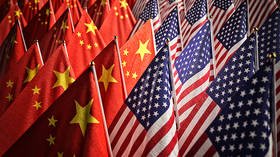Pompeo has wilfully crossed China’s red line on Taiwan, and now the world waits to see how Beijing will respond
US Secretary of State Mike Pompeo’s latest attempt to improve ties between America and Taiwan has enraged Beijing and is a direct challenge to Xi Jinping. How China reacts could be a major problem for Joe Biden.
On Saturday, Mike Pompeo lifted restrictions between American officials and their counterparts in Taiwan, saying the engagement rules were “null and void.”
Claiming the protocols were self-imposed in order to appease Beijing, Pompeo said the State Department would no longer follow them, prompting a furious response from China, which declared his decision as “crossing a red line.”
Also on rt.com As US confirms its descent into chaos and depravity, emboldened China looks on with growing confidenceWith occupancy of the White House set to change in little over a week, the move is widely seen as the dropping of a bomb for President-elect Joe Biden as he prepares to take office, and an attempt to orchestrate a crisis with Beijing. Taiwan quickly moved to praise Pompeo, however, saying his move had elevated the Washington-Taipei relationship to a “global partnership.”
What does China do now? It’s never been a secret that Pompeo has sought to push against the ‘One China Policy’ – a staple of America’s diplomatic relationship with the People’s Republic of China (PRC) since the ’70s.
Beijing has built its ideological legitimacy around the fabric of eventually achieving reunification with Taiwan and blocking moves towards its formal independence. If America subsequently succeeds in pushing back against this without any retaliation, it would represent a major blow to Beijing.
While China is aiming to rebuild its relationship with the US under Biden, it cannot allow this move by Pompeo to go unchecked. Logically, there must be some form of retaliation, despite the risks that come with it. How things play out will be fascinating.
Taiwan matters. In the Chinese Civil War of 1945 to 1949, the Communist Party was victorious in its takeover of mainland China, and sent the previous Kuomintang government fleeing to the island of Taiwan, where it re-established the government of the Republic of China.
Naval protection from the US prevented Mao Zedong from retaking the island, which left a legally ambiguous status quo of division. Beijing argues that Taiwan has no legitimacy as a separate state and its territory is legally part of China.
On an official basis, Taiwan, for its part, still lays formal claim to the entirety of mainland China. However, having been divided from the mainland for so long, many on the island no longer identify with China and increasingly see themselves as a separate entity, not least because of changes to the political system by way of democracy.
Despite all this, Beijing is not able to compromise, as the PRC has long built its legitimacy on achieving the “revival and reunification of China,” drawing a contrast with the country’s previous century of humiliation, when it was exploited and subjugated by foreign powers.
With the US having orchestrated the division of the mainland and Taipei, China sees the situation as a legacy of imperialism. To give in on this issue would destroy for its own population the political legitimacy and narrative of the state itself.
Also on rt.com America’s fantasy that China will soon collapse like the Soviet Union did is based on arrogance and ideology, not facts and reasonFor Xi Jinping, there are no ifs and no buts: Taiwan ought to be reunified with China and, if necessary, by force. No state willingly gives up its territorial integrity without a fight, and thus, since 1949, it has advocated the One China Policy as a prerequisite for diplomatic relations. What this means is that those who wish to do diplomacy with China are not permitted to have official relations with Taiwan.
Although the US accepted this policy in 1978, it has nonetheless maintained unofficial relations with Taipei, and has supported it in the form of military assurance and assistance. Even so, this did not cross Beijing’s red line during what was a period of generally positive ties and engagement between the US and China.
Now, however, with anti-China sentiment having surged in Washington in what is being depicted as a ‘new cold war’, US support for Taiwan has increased significantly. This has happened in tandem with the political success of the administration of Taipei’s Tsai Ing-wen – an advocate of formal independence who has rejected reunification with Beijing.
As ties between Washington and Beijing have crashed, so, in lockstep, have cross-strait relations. China has responded by intensifying military exercises and sending fighter jets towards Taipei’s airspace in what has been described as “grey zone warfare.”
And now Pompeo has ratcheted up tensions against China even further in an attempt to lock Biden into a hawkish policy. Although he himself cannot end Washington’s adherence to the One China Policy, he is effectively trying to accelerate ties with Taipei – something he knows will aggravate Beijing.
The latest move by him is bureaucratic, allowing the state department to contact Taipei how it pleases. It’s not so much about what this will do in practice, but more the problems it will cause for the next administration – especially if Beijing reacts and causes a potential crisis.
This is undoubtedly a dilemma for Xi Jinping. Even if the Biden administration quietly and subtly rolls back this move and sustains existing protocol, the public symbolism of this action and the response from Taiwan will remain on the record in a way that is detrimental and embarrassing to China.
Beijing’s policy on Taiwan has always been based on the logic of deterrent – using its diplomatic, economic, and military power to prevent states crossing the lines it has set. Pompeo is attempting to move the line. If Beijing does not respond, it risks losing face on this issue. So, what does it do?
China is not foolish enough to start a war over Taiwan, given the probability of US involvement. However, it has to take a course of action that will now reset the red line and punish Taipei. This is likely to include tougher military exercises that push and provoke slightly more than usual, clearly demonstrating the potential consequences.
It also has to be something that can be executed quickly, as opposed to escalating a huge crisis that will drag on into the early days of the Biden administration and force him to also take a tough approach, as Pompeo hopes. Do not assume Beijing will simply let this move pass by. This is an issue that could make or break a nation. China has to respond, and the world is watching to see what it will do.
Like this story? Share it with a friend!
The statements, views and opinions expressed in this column are solely those of the author and do not necessarily represent those of RT.















